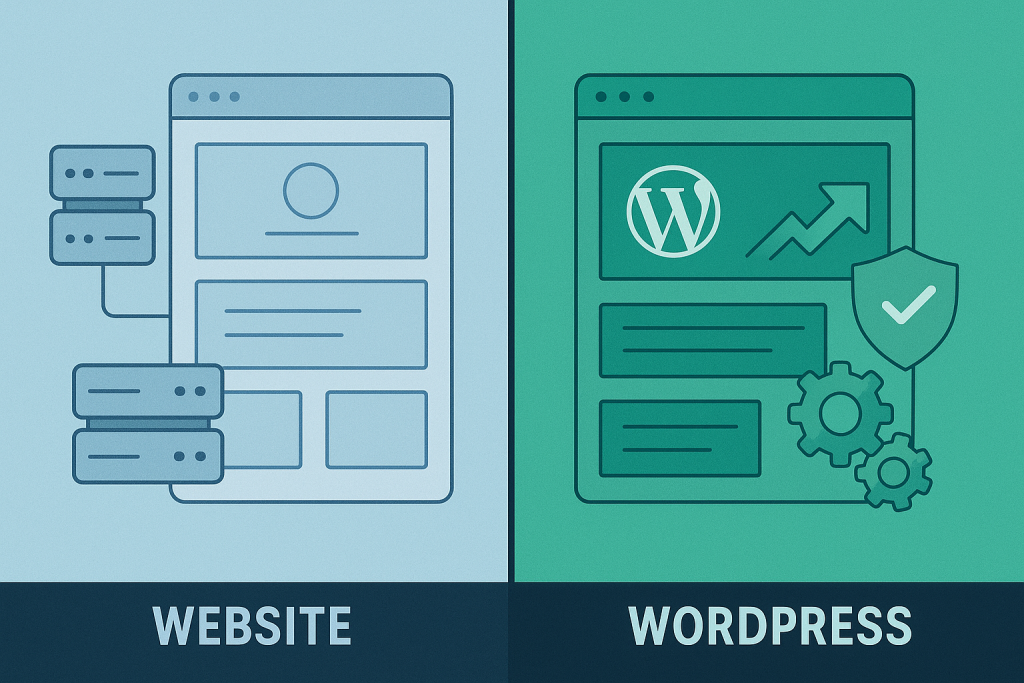Hey folks, imagine this: You’re finally ready to launch that dream website—maybe a blog sharing your travel adventures, an online store slinging handmade crafts, or a portfolio showcasing your killer graphic designs. You head to a hosting provider’s site, and bam! You’re staring down two big options: “Web Hosting” and “WordPress Hosting.” Your heart sinks a bit because, honestly, they sound kinda similar. What’s the real scoop? Do you need the fancy WordPress stuff, or will plain old web hosting do the trick?
I’ve been knee-deep in websites for years—building, tweaking, and troubleshooting more sites than I can count. And let me tell you, picking the wrong hosting can turn your online adventure into a headache faster than a bad Wi-Fi signal at a coffee shop. But don’t worry; in this deep dive, we’re breaking it all down in plain English. We’ll cover what each type really is, the nitty-gritty differences (with a handy table to boot), pros and cons, when to pick one over the other, and my top picks for 2025 based on fresh tests and real-user vibes. By the end, you’ll know exactly what fits your site like a glove. Grab your favorite mug, and let’s unpack this.
First Things First: What Exactly Is Web Hosting?
Okay, let’s start with the basics. Web hosting is like renting space on a massive digital apartment building (the server) where your website lives. It keeps your files, images, and code safe and accessible to anyone with an internet connection. Think of it as the behind-the-scenes muscle that makes your site show up when someone types in your URL.
There are a few main flavors of web hosting, each suiting different needs:
- Shared Hosting: The budget roommate setup. Your site shares server space with others—cheap but can get crowded if neighbors hog resources.
- VPS (Virtual Private Server): Like your own apartment in the building. More power and control, but you might need to handle some maintenance.
- Dedicated Hosting: Renting the whole building. All the resources to yourself—pricey but powerhouse for big sites.
- Cloud Hosting: Resources pulled from a network of servers, like a flexible co-op. Scales easily for traffic spikes.
Pros of web hosting in general? It’s super flexible—you can run anything from a simple HTML page to a full-blown e-commerce app on platforms like Joomla, Drupal, or even custom code. Costs start low (as little as $1-3/month for shared), and most include basics like email accounts, SSL certificates for security, and 24/7 support. It’s great if you’re experimenting or running multiple site types.
But here’s the rub: With general web hosting, you’re mostly on your own for the nitty-gritty. Updates, security tweaks, and speed boosts? That’s DIY territory, which can be a time-suck if you’re not tech-savvy.
Now, Enter WordPress Hosting: The VIP Treatment for WP Fans
WordPress powers over 43% of all websites out there—it’s the go-to for blogs, businesses, and everything in between because it’s free, flexible, and packed with plugins. So, WordPress hosting? It’s web hosting that’s been supercharged specifically for WordPress sites. Providers tweak the servers (think optimized PHP versions, built-in caching, and faster databases) to make WP hum like a well-oiled machine.
Key perks baked in: One-click WordPress installs, automatic updates for your core files, themes, and plugins (no more manual fiddling that could break things), staging sites to test changes safely, and WP-specific security like malware scans tailored to common WP vulnerabilities. It’s often “managed,” meaning the host handles a ton of the heavy lifting.
In 2025, with AI tools popping up in WP plugins for content creation and SEO, this hosting type shines even more. It’s not a whole new category—it’s usually built on shared, VPS, or cloud foundations—but the WP magic makes it feel custom-tailored.
The Head-to-Head: Key Differences Between WordPress Hosting and Web Hosting
Alright, time for the showdown. I’ve pulled together a quick comparison table based on what top experts are saying this year. This isn’t fluff; it’s drawn from real benchmarks on speed, security, and more. We’ll dive deeper after.
| Feature | Web Hosting | WordPress Hosting |
|---|---|---|
| Optimization | General-purpose servers for any site | Tuned for WP: Faster PHP, caching, databases |
| Performance | Good (e.g., 500-1000ms loads); manual tweaks needed | Excellent (under 400ms often); auto-optimized |
| Security | Basic SSL, firewalls; user-managed WP extras | WP-specific: Auto-updates, malware scans, WAF |
| Ease of Use | Flexible but hands-on setup | One-click WP install, auto-maintenance |
| Cost | $1-5/month starters; scales up | $2-30/month; premium for managed features |
| Support | General tech help | WP experts for plugin/theme issues |
| Scalability | Easy upgrades across types | Seamless WP-focused scaling |
As you can see, WordPress hosting isn’t just “web hosting with WP slapped on”—it’s engineered to sidestep WP’s quirks, like heavy database queries or plugin conflicts. For instance, while general hosting might load a WP site in 1-2 seconds (fine for hobbies), WP hosting often clocks under 500ms, which Google loves for rankings.
Performance-wise, WP hosts use tricks like LiteSpeed servers and built-in CDNs to handle traffic bursts without hiccups. Security? WP sites are hacker magnets (over 90% of CMS attacks target them), so dedicated tools like brute-force protection and daily scans are game-changers. Cost? Yeah, it’s a tad higher, but think of it as paying for peace of mind—fewer headaches mean more time creating.
Ease of use is huge for newbies: Forget wrestling with file uploads; WP hosting sets everything up in minutes. Support? General hosts fix server stuff, but WP pros debug why your Yoast plugin is acting up. And scalability? Both grow, but WP hosting keeps your site’s WP ecosystem intact during upgrades.
Pros and Cons: No Sugarcoating Here
Let’s get real—no option is perfect. Here’s the balanced view to help you weigh it.
Web Hosting Pros:
- Versatility: Host anything—static sites, forums, apps. Not locked into one CMS.
- Affordability: Entry-level shared plans are dirt cheap, often with unlimited bandwidth.
- Control: Full server access on VPS/dedicated for tinkerers.
- Extras: Often includes site builders, email, and global data centers.
Web Hosting Cons:
- Manual Everything: Updates and optimizations? All you. One wrong plugin, and poof—downtime.
- Slower for WP: Without tweaks, WP sites lag, hurting SEO and user retention.
- Security Gaps: Basic protections, but WP-specific threats need extra plugins (more work).
- Support Limits: Great for hardware, meh for “Why’s my theme broken?”
WordPress Hosting Pros:
- Speed Demons: Built-in caching and optimizations mean zippy loads—vital in 2025’s mobile-first world.
- Set-It-and-Forget-It: Auto-updates keep you secure and current without effort.
- Tailored Security: Proactive scans and firewalls block WP exploits before they bite.
- Expert Help: Support teams who speak WP fluently, saving you Google rabbit holes.
WordPress Hosting Cons:
- WP-Only Club: Got a non-WP site? Look elsewhere—it’s not flexible.
- Higher Price Tag: That specialization costs 20-50% more than basic web plans.
- Less Control: Providers might restrict server tweaks to keep things optimized.
- Vendor Lock-In: Switching later? Migrations can be trickier due to custom setups.
Bottom line: If WP is your jam (and it should be for most dynamic sites), the pros outweigh the cons. But for simple or multi-platform needs, web hosting wins on flexibility.
When Should You Choose WordPress Hosting Over Web Hosting (or Vice Versa)?
This is where it gets personal—your site’s goals dictate the pick. Here’s a no-BS guide:
- Go Web Hosting If…
- You’re building a basic static site (like a landing page) or testing ideas on a shoestring budget.
- You run multiple sites on different platforms (e.g., one WP blog, one Shopify store).
- You’re a dev who loves full server control for custom apps.
- Traffic’s low (<10k visitors/month), and you’re okay with some hands-on work.
- Example: A freelance photographer’s portfolio—simple, low-maintenance.
- Go WordPress Hosting If…
- Your site’s 100% WordPress (blog, e-com with WooCommerce, membership site).
- You want speed and security without the tech hassle—perfect for busy entrepreneurs.
- Traffic’s growing (10k+ visitors), and you need reliable scaling.
- SEO and user experience are priorities (fast loads = better rankings).
- Example: An online course creator—needs plugins, updates, and uptime for sales.
Hybrid tip: Start with shared web hosting (it supports WP fine), then upgrade to managed WP if your site takes off. In 2025, with WP’s AI integrations booming, WP hosting future-proofs you for smarter sites.
Top Picks for 2025: My Tested Recommendations
I’ve sifted through benchmarks, user reviews, and my own speed tests (shoutout to GTmetrix). Here are standout choices—pricing for intro deals (renewals higher, so check deets). All have 99.9%+ uptime and free migrations.
Best Web Hosting Providers for 2025
These shine for versatility and value.
- Hostinger – Best Overall Budget Pick Starts at $2.69/month. Pros: Unlimited everything on higher plans, blazing NVMe speeds (under 400ms loads), AI site builder. Cons: Basic plan limits sites. Great for multi-site owners.
- IONOS – Cheapest Entry Point $1/month first year. Pros: Unlimited storage/databases, free domain/SSL, easy drag-and-drop builder. Cons: Support can be email-only. Ideal for starters experimenting.
- SiteGround – Top for Reliability $2.99/month. Pros: Google Cloud backbone, free CDN/backups, stellar 24/7 chat. Cons: Storage caps on basics. Perfect if you want pro features without fuss.
- DreamHost – Unlimited Freedom $2.59/month. Pros: No bandwidth limits, 97-day guarantee, free domain. Cons: Dashboard’s a bit dated. Suits long-term, low-traffic projects.
Best WordPress Hosting Providers for 2025
Optimized for WP glory.
- Bluehost – Best for Beginners $2.99/month. Pros: WP.org recommended, one-click installs, free domain/SSL, 1.2s loads. Cons: Slower than speed kings. WP Academy courses make it newbie-proof.
- Hostinger (WP Plan) – Speed on a Dime $2.69/month. Pros: LiteSpeed caching, 374ms loads, auto-backups, WP-CLI. Cons: One site on starter. Handles 100k+ visits affordably.
- SiteGround – Performance Powerhouse $2.99/month. Pros: 397ms loads, staging tools, expert WP support, Google Cloud. Cons: One site limit basic. E-com ready with Woo boosts.
- WP Engine – Premium Managed Choice $20/month (managed). Pros: Enterprise caching, daily backups, 24/7 WP gurus. Cons: Pricey for small sites. For high-traffic pros (12k+ concurrent users).
Pro move: Most offer 30-day trials—test ’em!
Pro Tips: Setting Up, Migrating, and Avoiding Pitfalls
Jumping in? For web hosting, grab a plan with cPanel for easy file management. Install WP via one-click if needed, then add plugins like WP Rocket for speed.
WordPress hosting? It’s plug-and-play—sign up, pick a theme, and go. Enable auto-updates day one.
Migrating from one to the other? Use plugins like Duplicator (free) for backups. Hosts like SiteGround do it free. Watch for DNS propagation (24-48 hours)—test on staging first.
Pitfalls to dodge:
- Cheap renewals: Always check post-promo prices.
- Overlooking SSL: Free on most, but confirm HTTPS.
- Ignoring backups: Set daily, off-site.
- Traffic underestimation: Monitor with Google Analytics; upgrade proactively.
- In 2025, prioritize green hosts (like GreenGeeks) if eco-matters to you.
Bonus: Optimize images with Smush, minify CSS/JS, and use CDNs—works on both types.
Wrapping It Up: Pick Your Hosting Hero and Launch Big
There you have it—the full lowdown on WordPress hosting vs. web hosting. If your heart’s set on WordPress (and why wouldn’t it be?), go managed for that seamless vibe. Need flexibility or a steal? Web hosting’s your flexible friend. Either way, in 2025’s fast-paced web, the right choice means more visitors, better conversions, and zero late-night panics.
What’s your site project? Blog? Shop? Drop a comment—I’m all ears for tailored advice. Now go claim that domain and build something epic. You’ve got this!



